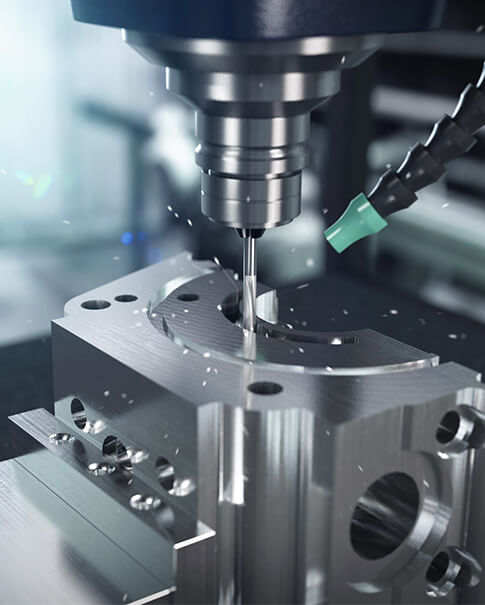
CNC Machining
|
CNC Machining Services |
 |
CNC Machining Processes:
|
CNC milling is a subtractive manufacturing process, 3-axis and 5-axis cutting tools are programmed and managed by computer numerical control (CNC), removing material from the plastic or metal block. |
The components of a CNC mill include: end mill & tool holder (1), tool changer (2), tool carousel (3), spindle (4), 2-axis milling head (5), air/coolant supply tubes (6), fixture (7), work piece (8), tool setter (9), x- and y-axis table (10). |
|
The components of a CNC lathe include: workpiece (1), sleeve (2), spindle (3), cutting tool and tool holder (4), live machining (5) and tool tower (6). |
CNC Turning: CNC turning is a particular form of precision machining in which a cutter removes material by making contact with the spinning workpiece. The movement of the machinery is controlled by computer instructions, allowing for extreme precision and repeatability. Turning is different to CNC milling, in which the cutting tool rotates and is directed from multiple angles at the workpiece, which is usually stationary. Because CNC turning involves rotating the workpiece in a chuck, it is generally used to create round or tubular shapes, achieving far more accurate rounded surfaces than would be possible with CNC milling or other processes. |
The tooling that is used with a CNC lathe machine is mounted to a turret. This component is programmed to make certain movements and remove material from raw materials until the desired 3D model is formed.
Like CNC milling, CNC turning can be used for the rapid manufacture of either prototypes or end-use parts.
CNC Machining Materials:
If you are considering manufacturing your parts with CNC machining, it is important to know what kind of materials and finishes can be applied to your CNC machined parts. GT, located in China, is not just a CNC shop; we can also apply all types of finishes to CNC prototype parts and production parts thanks to our surface finishing partners. Need custom CNC parts with a high-quality appearance? GT is here to help.
| Plastic | ABS, PC, ABS+PC, PP, PS, POM, PMMA (Acrylic), PAGF30, PCGF30, Teflon, DHPE, HDPE, PPS, PEEK |
| Metal | Aluminum, Steel, Stainless Steel (17-4, Inconel 625 & 718), Magnesium, Titanium, Zinc, Brass, Bronze, Copper |
Besides that, we can work with any type of machinable plastic and metal we can purchase from the stock market. Review More Materials & Finishes Options
CNC designs can be produced using dozens of additional materials. Contact us today or discuss your projects. We’d be happy to explain your material choices and production options with you!
How much does it cost to manufacture CNC machined parts?
There are 4 key factors that contribute to your parts, raw material, machine time, labour and speed.
It will be no surprise that some materials are more expensive than others, for metals, steel and aluminium are abundant and have the lowest raw material cost per kg whilst for plastics Acetal, Nylon, Acrylic and ABS tend to work out cheaper.
In the middle of the spectrum for metals you have more specialist aluminiums and stainless steels (containing expensive alloying elements) and for plastic glass-filled grades.
At the high-end you have materials like titanium (which is abundant but difficult to refine) for metal and plastics such as PC, PEEK, PSU, PPSU, PEI and POM-ESD, generally required to meet a specific need.
Things such as part complexity and material machinability play a factor here and of course the quicker you want something the more you are likely to pay, remember to compare costs like for like, considering both price and delivery.
CNC Machining Tolerances:
|
With a wide range of CNC machines, we are able to provide stand tolerance CNC machined parts with the most economic price and super precision machined parts for the high-end products. When working with GT-prototype, we guarantee all parts will be made accordingly to your specification.
|
 |
FAQ
What is the Advantages of MetaL CNC machining Process?
Metal CNC machining is a great process to meet a range of needs in product development Quick removal of large amounts of metal material Highly accurate and repeatable volumes from one to hundred thousands Economical and preparation costs Fast turnaround and varieties of finish treatments
What metal material can I use in CNC machining?
many types of easily available stock metals including mild and stainless steel, aluminum, brass, copper, magnesium and titanium, and we also close to raw material supplier that easy to get the Non-stock material, too
How do I know my design will be kept confidential?
We of course will sign and adhere to any non-disclosure or confidentiality agreement. We also have a strict policy within our factory that no photographs are ever allowed of a customer’s product without express permission. Ultimately we rely on our reputation of working with hundreds of thousands of unique designs over many years and never allowing any proprietary information to be disclosed to a third party.
When do I need a 5-Axies CNC process?
5-Axis CNC machining has the freedom of motion to produce some very complex geometries, when the Standard 3-axis CNC machines can't move the cutting tool in a manner that a 5-Axies CNC process is needed, send us an CNC inquiry, we will reply you back on the suggestions.
Parts of the product:
 |
 |
 |
 |
 |
 |